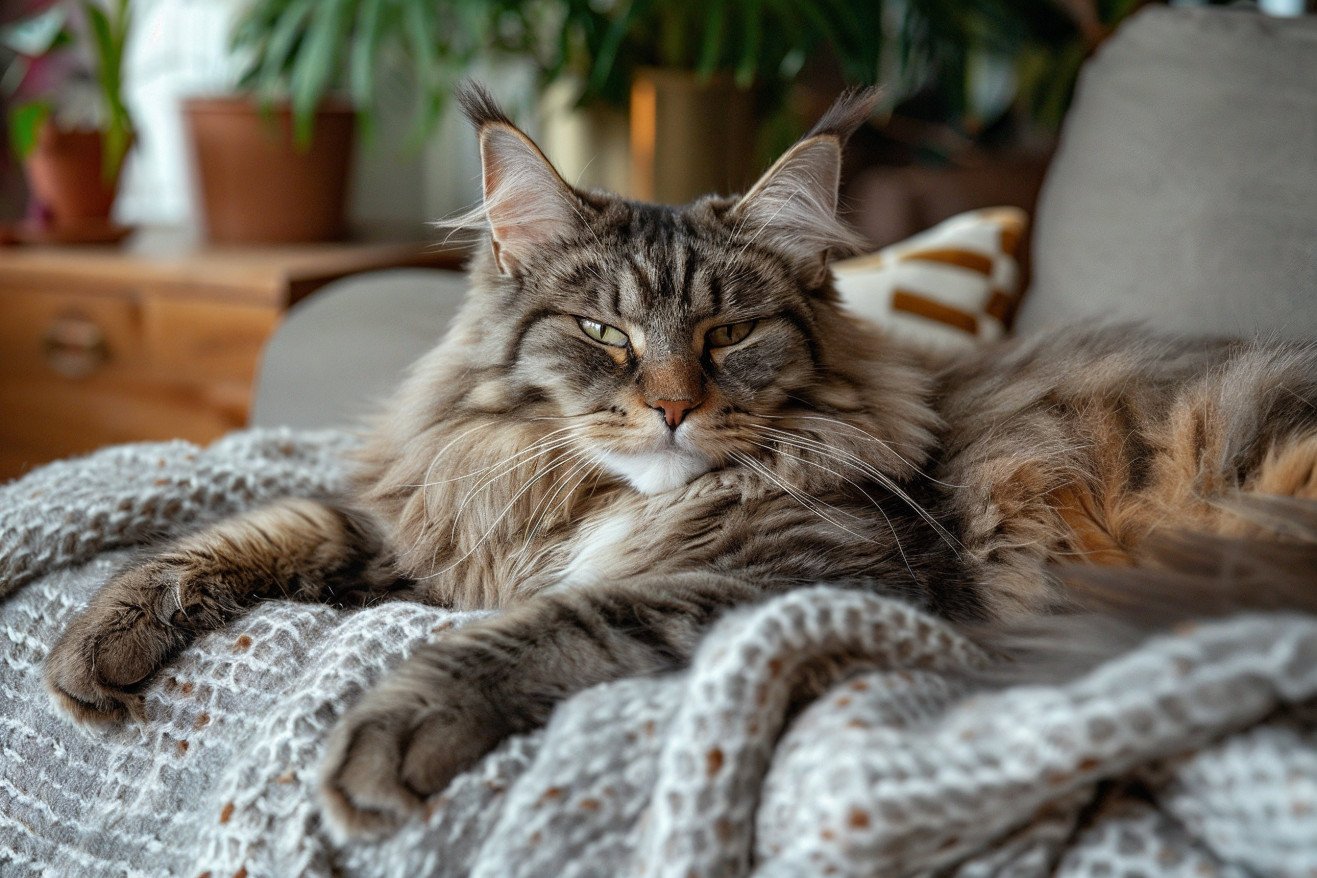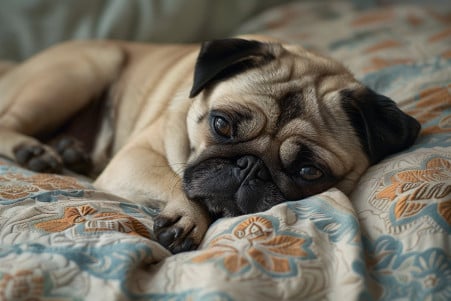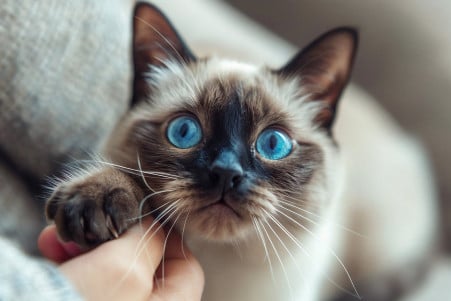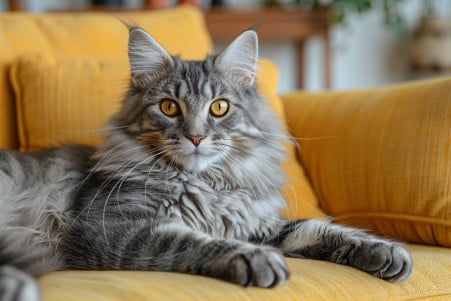Why Do Cats Suck on Blankets? Exploring the Science Behind This Behavior
24 April 2024 • Updated 23 April 2024

If you've ever found yourself wondering why your cat seems to suck on your favorite blanket, you're not alone. There are a number of reasons why cats exhibit this behavior, including kitten nursing, stress, and even medical issues. While this behavior can seem odd, especially if you've never seen it before, it's often related to kittenhood nursing behaviors that provide comfort. That said, it can also be a sign of stress, digestive problems, or even a nutritional deficiency.
In this article, we'll take a look at a number of scientific studies that have investigated the potential causes of blanket sucking in cats. From developmental psychology and ethology to feline medicine, we'll cover a lot of ground to help you better understand why your cat might be drawn to your favorite throw. With this knowledge, you can better address any issues that may arise and help your cat stay healthy and happy.
Why do cats suck on blankets?
Why Do Cats Knead? The Psychology Behind Your Cat's Kneading
Kneading, often referred to as 'making biscuits,' is a behavior in which cats push and pull their paws against soft surfaces like blankets or clothing. This instinctual behavior is thought to have originated from wild cats who padded down tall grass to make a comfortable bed. In our pet cats, kneading is often a sign of happiness, comfort, and even a way to mark their territory.
Despite its odd appearance, kneading is comforting because it's a throwback to the way kittens knead their mother's belly to stimulate milk flow. This is also why some cats chew or suck on fabric while they knead - it's a sign that they're still in a nursing state from when they were kittens. The repetitive motion of kneading releases dopamine in the brain, which can help calm cats who are feeling anxious or stressed.
Kneading often goes hand in hand with sucking on blankets because both behaviors are comforting and reminiscent of nursing. This means that your cat's kneading and blanket sucking are related and can be explained by the same psychological factors. Although it may seem strange, your cat's 'biscuit making' is a natural, soothing behavior that harkens back to their days as a nursing kitten.
Breed Tendencies: Are Some Cats More Likely to Suckle on Blankets?
Some cat breeds, especially those of Oriental descent like Siamese and Burmese, are more likely to suckle and suck on blankets. According to The Cat's Meow Rescue, this is likely because these breeds have a longer weaning period than other cats. Genetic and breed-specific factors may also make some cats more likely to suck on blankets.
As mentioned by Lake City Animal Hospital, Oriental breeds like Angora, Burmese, Siamese, and Turkish Van are the most commonly reported breeds to suckle as adults, which is thought to be due to their longer weaning period. On the other hand, Persians and Russian Blues are among the breeds least likely to suckle.
Knowing breed tendencies can help cat owners anticipate and deal with this behavior in their pets. However, as Catster explains, blanket sucking can happen in any breed of cat, and individual differences are also important to consider.
When to Worry About Your Cat's Blanket Sucking
For the most part, blanket sucking is a normal and harmless behavior that helps cats feel safe and secure. Pet Parents® explains that cats suckle on blankets to self-soothe, and the texture of the blanket can remind them of their mother's fur. However, Pet Wellbeing points out that blanket sucking can become an issue if it's excessive or destructive, especially if the cat swallows fabric.
If a cat suddenly starts or increases the frequency of blanket sucking, it could be a sign of an underlying problem, such as stress, anxiety, or a medical issue. Cats.com explains that excessive suckling could be a sign of separation anxiety or another issue that needs to be addressed. This is why it's important for cat owners to keep an eye on their pet's behavior and consult a vet if they have any concerns.
Knowing the difference between normal and abnormal blanket sucking can help ensure a cat's well-being. While most cats' blanket sucking is harmless, if it's persistent or destructive, it may be necessary to address the underlying causes to make sure the cat stays healthy and doesn't experience any issues.
How to Stop Your Cat From Sucking on Blankets
If your cat’s blanket sucking is excessive or problematic, there are several ways you can work to stop the behavior. Rover.com suggests offering alternative items, such as cat-safe chew toys or blankets that are specifically for suckling. The Spruce Pets also suggests removing the items that tempt your cat, like blankets, throws, and clothing, from their environment.
You can also help reduce stress and anxiety that may be contributing to the behavior by enriching your cat’s environment with mental stimulation, exercise, and safe spaces. BeChewy also notes that in some cases, a veterinarian may suggest calming pheromones, supplements, or medications to help with underlying issues.
No matter what, it’s important to be consistent and patient while working to stop your cat’s blanket sucking. It’s also important to address any underlying issues that may be causing the behavior. With time and effort, cat owners can help their pets overcome this compulsive behavior and ensure their happiness and health.
When to Talk to a Vet About Blanket Sucking in Cats
While blanket sucking is typically harmless, it can sometimes be a sign of an underlying medical issue. Per Cats.com, excessive or sudden changes in blanket sucking, especially when other symptoms like weight loss or vomiting are present, may be a sign of a gastrointestinal problem or a nutritional deficiency. Also, if a cat consumes a lot of fabric fibers, it can result in intestinal blockages and other issues.
As Yahoo News points out, it's a good idea to talk to a vet if the blanket sucking continues even after environmental enrichment has been attempted or if the cat seems sick. This way, potential medical issues can be addressed early on and a professional can ensure the cat's health and happiness.
Conclusion: How to Understand and Deal With Your Cat's Blanket-Sucking Behavior
Blanket sucking is a normal, instinctual behavior in cats that can be traced back to their nursing days and that can help them feel safe and secure. That said, while blanket sucking is typically nothing to worry about, if your cat suddenly starts doing it more often or more intensely, it could be a sign of an underlying issue. In addition, some cat breeds, especially Oriental breeds, may be more likely to suck on blankets because of genetic and breed-specific factors, according to The Cat's Meow Rescue.
If you're concerned about your cat's blanket-sucking behavior, you can help manage it by enriching your cat's environment, providing alternative objects for your cat to suck on, and addressing any underlying causes. For example, Rover.com suggests that you can provide alternative objects for your cat to suck on, such as cat-safe chew toys or blankets that are specifically designated for suckling. Meanwhile, The Spruce Pets also suggests that you can help your cat stop sucking on blankets by putting them away in a place where your cat can't access them.
If your cat's blanket-sucking behavior continues or you're worried about your cat's well-being, it's best to consult with a vet. In fact, Cats.com points out that excessive suckling may be a sign of separation anxiety or another issue that needs to be addressed. By getting help early and working with a vet, you can make sure that your cat is as healthy and happy as possible.


